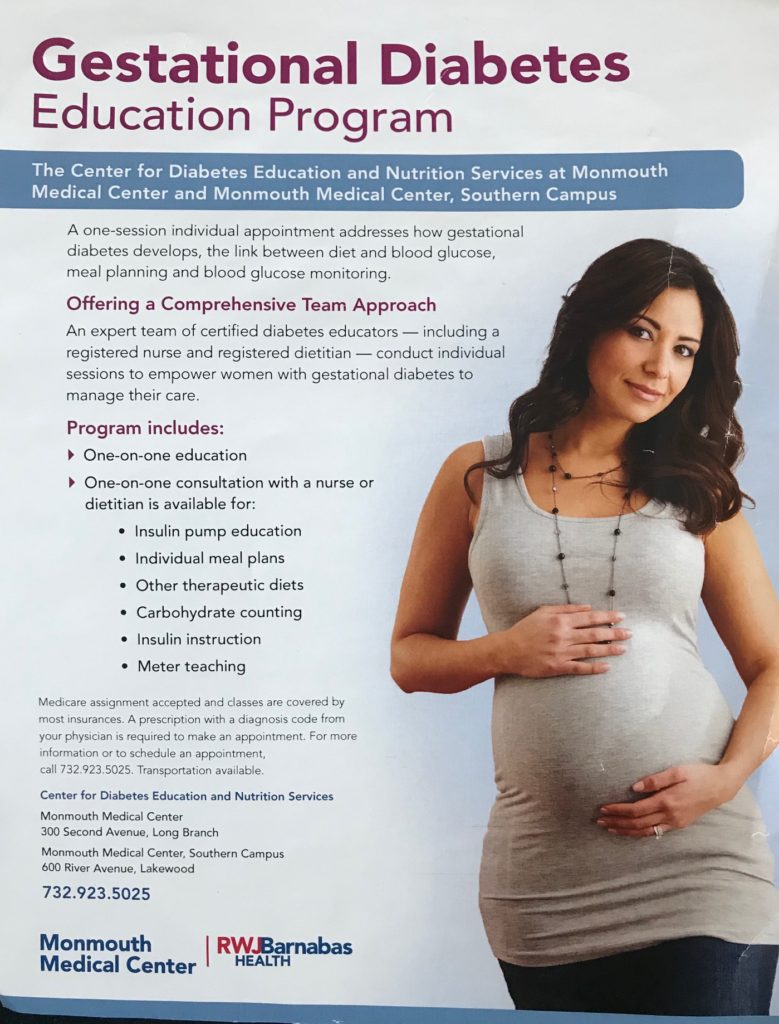
As a recent second-time new mom, the ups and downs of pregnancy aren’t too far behind me. The potentially dizzying array of tests and doctor’s visits are just one of the many changes a mom-to-be learnt to navigate during the longest but shortest 40 weeks of her life.
For some of these new mommas, gestational diabetes is another manageable but understandably nerve-racking piece of their journey.
Thankfully, there are programs such as The Gestational Diabetes Education Program at the Center for Diabetes Education and Nutrition Services at Monmouth Medical Center, an RWJBarnabas Health facility, which works one on one with new moms to make the management of gestational diabetes easier and manageable.
With the help of NJMOM and RWJBarnabas Health, I had the pleasure of meeting with Autumn Dempsey, RN, CDE, one of the amazingly passionate and dedicated nurses at the Center for Diabetes who works with moms-to-be to help them understand and manage their gestational diabetes. I also toured the facility and was walked through the processeach mom goes through when in the program.
Keep reading to learn more about the program and the incredible work being done at Monmouth Medical Center.

1. What’s your name and role at Monmouth Medical Center?
My name is Autumn Dempsey and I’m a Registered Nurse and a Certified Diabetes Educator. I’m the program coordinator for outpatient, diabetes education, and nutrition services. Monmouth Medical Center is
regional, so we have this location in Long Branch and another office in Lakewood, Ocean County.
2. Do you work out of both facilities?
If I need to be there, I can get to the other office. However, I see most of my patients here in Long Branch. The Registered Dietitian sees patients at both locations. We are only at the Lakewood location 12 hours a week. We see our pregnant moms at both locations.
3. What does a regular day look like for you in your role as an educator? What does an appointment entail?
Our patient’ visits are scheduled like doctor’s appointments, so their OBGYNs or endocrinologists refer their patients here. Once they are scheduled, they come in and we counsel them one on one during the day. During the appointment we go over he cause of her gestational diabetes, what can we do to manage it, what should we be looking for, what’s normalmeal planning techniques, and how to monitor and track their blood sugar at home. From there, we customize the experience. We do not encourage dieting during pregnancy but to discuss healthy food choices. All of the information provided is shared with their doctor.

4. Have there ever been group classes for gestational diabetes management?
When we first launched the program in 2007, we toyed with the idea of doing classes. But, through trial and error, we decided not to and opted to do it on an individual basis. Everyone’s pregnancy is different and there are often other factors at play. So, this way it allows for a better experience for the moms and allows for it to be customized for the patient.
5. How does a mom end up getting diagnosed with gestational diabetes?
All pregnant women in the US take the one-hour glucose tolerance test between 24 and 28 weeks gestation. If the one-hour test is failed, a three-hour test is ordered. If two of the four blood tests come back abnormal, if one point over or 100, they can come for education. They may never have to make a change, but we want to make sure they are informed and understand choices they may have made that could possibly have a negative effect on their blood sugar.
6. What is the ultimate goal in gestational diabetes education and treatment?
The ultimate goal is to help keep the baby under 9 pounds. Yes, it is to keep the health of the mom in mind, but ultimately it is to help keep the baby at a healthy weight. When the baby is larger, there are potential risks that come into play. These include a Cesarean delivery that could have been prevented, or the baby getting stuck in the birth canal. The baby’s heart rate could go down, or the baby could have the opposite of high blood sugar, hypoglycemia. These are all omplications that we work to prevent.
Also, we are trying to manipulate the body to use the insulin it makes. By slowing down digestion, we are allowing the insulin to do its job.
7. What’s the biggest fear or concern that you see moms bring to appointments, and what do you do help ease them?
The number one fear is the glucose monitoring. No one comes excited about the idea of pricking their finger to check their sugar. One of our roles is helping to debunk the fears around that and help people learn how to do it correctly so it’s not painful. The majority of people that come feeling uneasy about it leave feeling much better, which changes their idea about the process and changes.
From there, we then get into the other things they are concerned about like the dietarychanges.
8. What’s a simple change that’s done during counseling that women can expect when coming to an appointment?
While many women come to us thinking they will have to go on a diet and give up everything that tastes good, that is not the approach we take. We believe you can eat the foods you enjoy, as long as you practicportion control and nutrient pairing. For instance, someone may think they could not have fruit because it has sugar (natural sugar). We do not discourage you from eating the fruit, but suggest eating nuts or cheese (something that’s not a carbohydrate) with the fruit. If you go out with your family for a pizza night, monitor how much you eat as opposed to thinking you can’t go at all. Just practice portion control.
9. How are these practices customized for pregnancy?
We try to take into consideration an individual as opposed to a textbook approach because pregnant women have cravings and food aversions and those must be taken into consideration. However, we try to help the mom figure out how to manage that. This approach makes it easier for her to enjoy her pregnancy. Sometimes, making the simple switch from fruit juices and sodas is all a person may need to do. Deprivation does not work.
10. What exercises or lifestyle changes can or should a pregnant woman diagnosed with gestational diabetes make?
When a pregnant woman is diagnosed with gestational diabetes, this is not the time to start a new strenuous exercise routine. This could be more dangerous. If you have not been moving much during the pregnancy, simple changes such as walking more during the day are helpful. Just trying to get more steps in can be incredibly helpful. Just be mindful of any discomfort and/or bleeding and discuss it with your doctor just to be sure.
11. What is the success rate for pregnant women that come to Monmouth Medical Center for gestational diabetes education?
I would say that approximately 70% of women diagnosed with gestational diabetes who come for counseling with us manage it without added intervention and with education alone.

12. Where could we find additional information about the Gestational Diabetes Education Program at the Monmouth Medical Center?
You can learn more about our program by visiting us on line at
https://www.rwjbh.org/monmouth-medical-center/treatment-care/center-for-diabetes-education/.
We also have reading material for any moms interested in the service and sessions.








